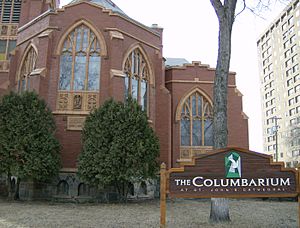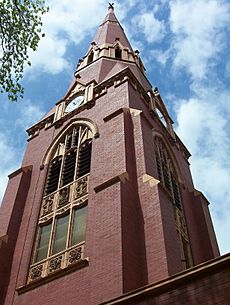Cathedral of St. John the Evangelist (Saskatoon) facts for kids
Quick facts for kids Cathedral of St. John the Evangelist (Saskatoon) |
|
|---|---|
 |
|
| 52°07′48″N 106°39′21″W / 52.129905°N 106.655917°W | |
| Location | 816 Spadina Crescent East Saskatoon, Saskatchewan S7K 3H4 |
| Country | Canada |
| Denomination | Anglican |
| History | |
| Status | Cathedral |
| Founded | 1902 |
| Architecture | |
| Architectural type | Gothic Revival |
| Groundbreaking | 1912 |
| Completed | 1917 |
| Specifications | |
| Capacity | 500 |
| Length | 40 metres (130 ft) |
| Width | 14 metres (46 ft) |
| Spire height | 44 metres (144 ft) |
| Administration | |
| Diocese | Anglican Diocese of Saskatoon |
| Province | Rupert's Land |
The Cathedral of St. John the Evangelist is an important church in Saskatoon, Saskatchewan, Canada. It is the main church for the Anglican Diocese of Saskatoon. You can find it at 816 Spadina Crescent East in the city's downtown area.
History of the Cathedral
Even though Saskatoon was started in 1883, the first Anglican church, St. John's, began in 1902. This was because many early settlers were from other Christian groups, like Methodists and Presbyterians. Saskatoon was also founded as a "temperance colony," meaning people tried to avoid alcohol.
The very first St. John's church was a simple wooden building, built in 1903. The larger, more permanent building you see today was constructed between 1912 and 1917.
In 1924, St. John's was named a "pro-cathedral." This meant it was a leading church, even though the main cathedral for the area was still in Prince Albert. Then, in 1932, the Anglican Diocese of Saskatoon was created. At that point, St. John's officially became its cathedral.
For many years, the cathedral only had a small organ and a piano for music. In 1956, a much larger organ was installed. This was later replaced by a new Casavant Frères organ in 1981-1982.
Building Design and Features

The current church building is made from brick, a special type of stone called Tyndall stone, and terra cotta. It was built in a style called "neo-Gothic," which looks like older Gothic churches but without too many fancy decorations.
One special part of the church is a screen called a "rood screen" near the front. The rood screen, the pulpit (where sermons are given), the lectern (where readings are done), and the main altar are all made from a material called Carrara ware. This material looks a lot like expensive Italian marble.
The first stone for the building was laid in 1912 by Prince Arthur, Duke of Connaught and Strathearn, who was the Governor General of Canada at the time. The church's foundation is made from strong fieldstone, which includes different kinds of rocks like granite and dolomite.
The main part of the church, called the nave, is about 40 meters (131 feet) long and 14 meters (46 feet) wide. When it was first built, the church could hold about 1100 people. Today, it can seat around 800 people because some pews (church benches) were removed to make space for a special altar in the middle.
Important visitors have worshipped at St. John's Cathedral. Queen Elizabeth II and her husband, the Duke of Edinburgh, attended services there three times: in 1951, 1959, and 1987. Another important visitor was Governor General Viscount Alexander, who worshipped there in 1948.
The beautiful stained glass windows in St. John's Anglican Cathedral have been carefully recorded by the Institute for Stained Glass in Canada.
More to Explore
- The Canadian Crown in Saskatoon
- Monarchy in Saskatchewan
 | John T. Biggers |
 | Thomas Blackshear |
 | Mark Bradford |
 | Beverly Buchanan |

